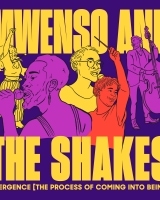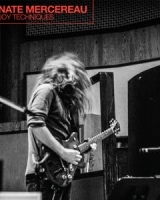Bordeaux, Part 3
[Continued from last week]

I awake in a sparse apartment — no covers on the bed. The radiator bleeds a constant hiss, making the room feel like a sauna. There are mismatched bedsheets tacked up over the windows. Clothes and shoes strewn about the floor.
My companion sleeps atop the sheets. I blink and blink again, her translucent freckled skin comes into focus. Without clothes, one can see her every vertebra, her every rib. Her limbs are nothing but muscle and bone.
The apartment’s buzzer calls out. Is that what woke me? Whoever it is hits the damned thing like the world is ending.
“You awake?” I ask, leaning over.
It’s been long enough without my wife that the beauty of a woman’s face without makeup startles me. Blemishes, wrinkles, and all. If I could shout to all women from a rooftop, I would. The war paint is unnecessary. There are only so many opportunities in life for true expression, true connection. Leave the facades at home. Face the world unadorned. Any man who complains will be dragged into the proverbial town square, stripped of their privilege, and made to endure a life of inverted inequality.
Or, if it’s not about looking pretty for anyone but yourselves, go for it. The last thing the world needs is another man telling women what they should do.
The buzzer will not quit. There’s street construction in my head. I stumble into a pair of pants, make a pit stop at the fridge. Pray for orange juice but come up empty. All that greets me is white wine and Chinese leftovers.
“Hello?” I say, pressing Talk on the intercom.
First fail of the day — I have just buzzed whoever it is into the building. I lean my forehead on the door, fall asleep briefly on my feet, then awake with a start when he knocks.
The delivery guy has a neck tattoo peeking out from under his collar. He hands me two overfilled grocery bags, I sag under their weight. Red wine, wine wine, vodka. Sourdough and Kerrygold butter. Tylenol. Toilet paper. Cat food.
“Esther Flint?” I ask, reading the receipt stapled to the bag.
He’s smacking gum first thing in the morning. “Red hair? Skinny, but like, too skinny?”
I turn my focus to the bags’ contents. “Guess she never told me her name.”
He takes out his phone and snaps a photo of me. “Living your best life,” he says, hashtagging down the stairs.
I shut the door, Esther hovers near the bedroom in silk flower robe. We come together in the kitchen where she starts to put things away. “Coffee?” she asks.
“Sure.”
“It’s pods.”
“That’s alright,” I say, noticing an especially prominent freckle at the end of her nose. “Where’s, um…?”
“Through there.”
In the bathroom, my piss is pure yellow. Zero water in my system. My face recalls Keith Richards. I use my finger as a toothbrush. Rinse, spit, repeat.
When I open the door, she’s there. She hands me a mug and slips past me. “Don’t think this meant anything because you stayed over,” she says, closing the door in my face.
The quotation on my mug says, “If you go home with somebody and they don’t have books, don’t fuck them.” I take a sip. Esther’s added vodka to our coffee.
The furniture in her living room is purely functional, there’s nothing on the walls. The bookcase is empty but every surface is stacked with manuscripts. I find one scratched with red ink revisions. My eyes do not wish to cooperate.
On the floor against the far wall is a suitcase record player. Beside it, two cardboard boxes full of records. I kneel, take another sip of rocket fuel, and sift through albums by Billie and Bessie, Etta and Ella, Dinah, Roberta, Edith. I pull out a copy of Ma Plus Belle Histoire D’Amour by the French singer Barbara. Her young monochrome portrait stares out from the cover — raised eyebrows, dramatic eyeshadow, pursed lips. I put the record on, the title track eases out of the speakers. A low, slow accordion builds to introduce her voice — intimate yet holding back emotion.
A white Himalayan appears on the fire escape outside the window. It sits and summons me with a mew, feigning royalty.
Esther returns as the strings roll into the song. She looks on the verge of saying something, then shuffles into the kitchen. She fills a bowl with cat food, places it outside. Our visitor gobbles it up.
“You played the B-side,” she says, joining me at the record player.
I nod.
“Coffee alright?”
I meet her eyes. The music swells, then softens. “Does your cat have a name?”
“Belvedere,” she replies. “But he belongs to no one.”
“Stray?” I ask.
She nods, closing her eyes, swaying with the music.
“His fur is so white.”
The piano skips along. I want to take her hand and lead her in a waltz. I want to guide us back into bed, not for another round just yet, but for the slight whistle from her nose as she sleeps, the growl of her stomach, her tiny half-words as she dreams.
I may be transposing.
“I should probably get dressed,” I say, at last.
“Me, too,” she says, a near whisper.
We stand together, listening. The instruments converge.
—
This piece appears as part of a serialized fiction experiment by Nathaniel Kressen for At Large magazine. New installments are published weekly, each based around a different liquor.
Nathaniel Kressen is the author of two novels — Dahlia Cassandra (named Best of 2016 Fiction by Entropy & Luna Luna Magazine) and Concrete Fever (Bestseller, Strand Book Store) — as well as the co-founder of Second Skin Books and the leader of the Greenpoint Writers Group. He was commissioned by At Large magazine to publish his third novel in serialization — now available, with new chapters publishing weekly — titled My Life on Rye. And, as one half of the wife-and-husband team Grackle + Pigeon, he’ll be publishing a tome for modern living this fall — Blanket Fort: Growing Up Is Optional (William Morrow). You can find his work at nathanielkressen.com.

